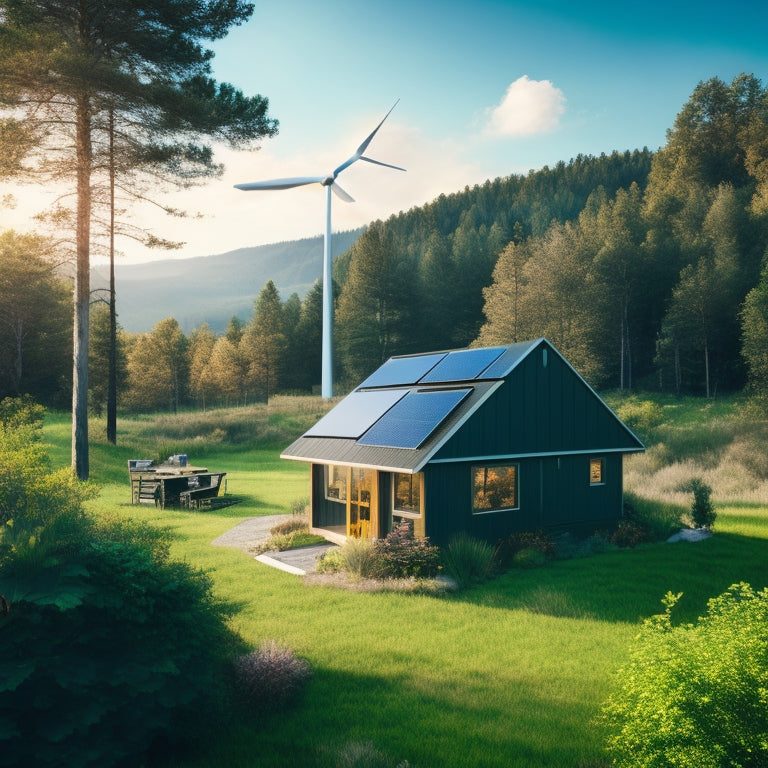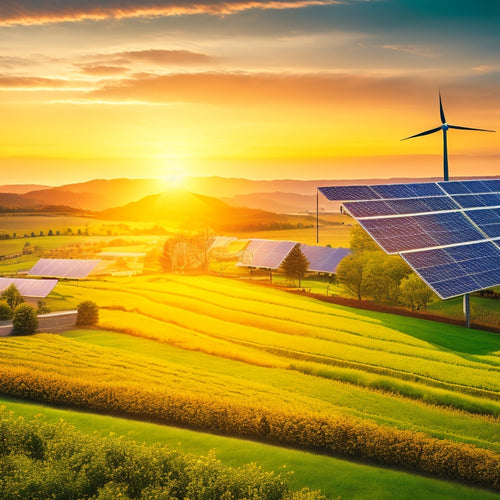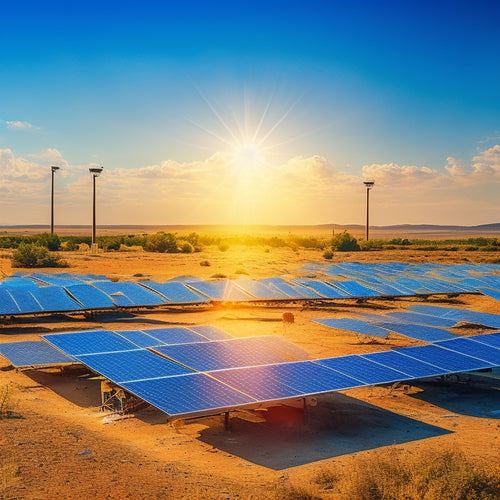
Solar Panel Systems for Independent Energy Living
Share
You're looking to cut ties with the grid and live independently with your own solar panel system. To achieve this, you'll need an efficient inverter that converts DC to AC power with high accuracy. A reliable energy storage solution, like deep cycle batteries, will stabilize your power supply. Choose solar panels with high efficiency ratings and a suitable mounting system. Properly sizing your system is essential - calculate your daily energy needs and consider appliance wattage and usage hours. By understanding these key components, you'll be well on your way to harnessing the power of the sun - and there's more to explore on this journey to energy independence.
Key Takeaways
• Choose a high-efficiency inverter with an efficiency rating above 95% to maximize energy production.
• Select deep cycle batteries for reliable energy storage and perform regular maintenance to extend their lifespan.
• Calculate daily energy needs accurately to design a solar panel system that meets off-grid energy requirements.
• Consider factors like appliance wattage, usage hours, and seasonal variations when performing load calculations for system sizing.
• Research and evaluate solar panels based on energy needs, certifications, and manufacturer warranties before making a purchase.
Solar Panel Inverter Options
Your solar panel system's inverter plays a crucial role in converting DC power from the panels into usable AC power for your home, and choosing the right inverter option is essential for peak system performance.
As you explore inverter options, you'll want to prioritize inverter efficiency, as it directly impacts your system's overall energy production. A high-efficiency inverter guarantees that more of the DC power generated by your solar panels is converted into usable AC power for your home.
When selecting an inverter, look for one that boasts high inverter efficiency, typically above 95%. This will ensure that you're maximizing your system's energy production.
Additionally, consider an inverter that can handle your system's maximum power output. This will ensure that your system operates at peak capacity, even during periods of high energy demand.
Off Grid Energy Storage Solutions
As you move towards off-grid energy independence, a dependable energy storage solution becomes essential to stabilize your power supply during periods of low solar irradiance or nighttime, when your solar panels aren't generating electricity. This is where off-grid energy storage solutions come into play. You'll need a reliable system to store excess energy generated by your solar panels during the day for use at night or on cloudy days.
When selecting an energy storage solution, consider the following key factors:
-
Deep Cycle Batteries: Designed to provide a steady flow of energy over a long period, deep cycle batteries are ideal for off-grid systems. They're built to withstand frequent charge and discharge cycles.
-
Battery Maintenance: Regular maintenance is important to extend the lifespan of your batteries. This includes monitoring temperature, voltage, and state of charge, as well as performing periodic equalization charges.
-
System Sizing: Properly sizing your energy storage system ensures you have enough power to meet your energy needs during periods of low solar irradiance or nighttime. A well-designed system will provide a stable power supply, even when the sun isn't shining.
Choosing the Right Solar Panels
With your energy storage system in place, you'll want to make sure that your solar panels are optimized to generate the maximum amount of power for storage. Choosing the right solar panels can be a challenging task, but understanding the key factors will help you make an informed decision.
| Panel Characteristics | Description |
|---|---|
| Efficiency Ratings | Measure of energy conversion from sunlight to electricity |
| Installation Methods | Roof-mounted, ground-mounted, or tracking systems |
| Cell Type | Monocrystalline, polycrystalline, or thin-film |
| Power Output | Measured in watts (W), affects system sizing |
| Warranty | Manufacturer's guarantee, typically 25 years or more |
When selecting solar panels, consider your specific energy needs and the installation method. Efficiency ratings, ranging from 15% to 22%, impact the system's overall performance. Monocrystalline cells offer higher efficiencies, while polycrystalline and thin-film cells are more affordable. Be sure to check the power output, measured in watts, to make sure it meets your energy storage requirements. Lastly, a thorough warranty provides assurance and protection for your investment.
System Sizing for Off Grid Living
Determine the size of your solar panel system by calculating your daily energy needs, taking into account factors like appliance wattage, usage hours, and seasonal variations. This is essential for off-grid living, as you'll need to make sure your system can meet your energy demands consistently.
To do this, you'll need to perform a load calculation, which involves tallying up the total wattage of all your appliances and devices.
Here are three key considerations to keep in mind:
-
Appliance wattage: Make a list of all your appliances, including lights, refrigerators, and laptops, and note their individual wattage ratings.
-
Usage hours: Calculate how many hours each appliance is used daily to determine your total daily energy needs.
-
Seasonal variations: Consider how your energy needs may change with the seasons, such as increased lighting needs during winter or higher cooling demands in summer.
Accurate load calculation is vital, as it will impact your wire sizing and overall system design. By carefully calculating your energy needs, you'll be able to design a solar panel system that meets your off-grid energy requirements efficiently and effectively.
Online Buying Guide for Solar
When shopping for solar panels online, you'll encounter a multitude of options, making it important to have a clear understanding of your energy needs and system requirements to make an informed purchase. With the vast array of products available, it's essential to research and evaluate the quality and authenticity of the solar panels you're considering.
To make sure you're purchasing from a reputable supplier, look for solar certifications such as UL (Underwriters Laboratories) and IEC (International Electrotechnical Commission). These certifications guarantee that the solar panels meet specific safety and performance standards.
| Certification | Description |
|---|---|
| UL Certification | Ensures solar panels meet US safety standards |
| IEC Certification | Guarantees solar panels meet international safety and performance standards |
| Online Reviews | Check reviews from multiple sources to get a thorough view of the product's performance |
| Warranty and Support | Look for manufacturers that offer extensive warranties and reliable customer support |
Frequently Asked Questions
What Are the Benefits of Using Microinverters Over String Inverters?
You'll be interested to know that 70% of solar panels underperform due to mismatched panels or shading. When choosing between microinverters and string inverters, you'll find microinverters offer superior Energy Efficiency and System Reliability, optimizing each panel's output for maximum energy harvesting.
Can I Install a Solar Panel System on a Rented Property?
You can install solar panels on a rented property, but you'll need your landlord's agreement and a clear understanding of the terms, ensuring you and your landlord benefit from the arrangement, with potential rent reductions or shared savings.
How Do Solar Panels Perform in Extreme Weather Conditions?
You'll be relieved to know that modern solar panels are designed to withstand extreme weather conditions, including hurricane-force winds and frost, with features like reinforced frames and thermal regulation to prevent frost damage.
Are Solar Panels Compatible With All Roof Types and Angles?
You'll find that solar panels can adapt to various roof materials, but installation challenges arise with unusual angles, curved or fragile roofs, requiring specialized mounts and careful planning to guarantee a secure and efficient setup.
Do Solar Panels Require Regular Maintenance or Cleaning?
You'll need to maintain your solar panels to guarantee peak performance; a regular cleaning schedule can boost panel efficiency by up to 25%, so set reminders to clean your panels every 6-12 months to maximize energy output.
Related Posts
-

Net Metering in Renewable Energy's Future
Net metering's future is vital for driving renewable energy growth and financial savings. You can reduce your electri...
-

What Happens Without a Charge Controller in Solar Panels
Without a charge controller in your solar panel system, you risk overheating batteries due to overcharging, which can...
-

Solar Powered Lights for Sustainable Home Decor
Solar-powered lights offer a stylish and eco-friendly way to enhance your home decor. They capture sunlight, converti...


